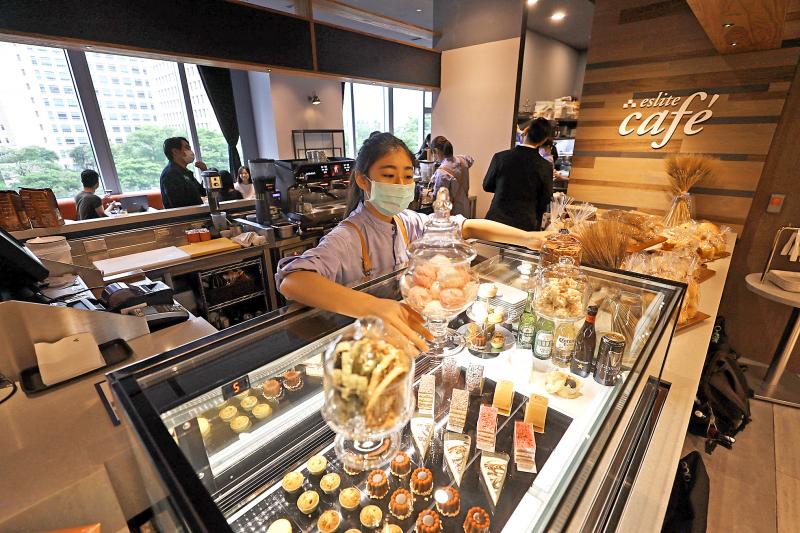Sales across Taiwan’s food and beverage sector nosedived 22.8 percent year-on-year to NT$47.9 billion (US$1.59 billion) last month, the largest decline in 20 years, the Ministry of Economic Affairs said yesterday.
One of the first victims of the COVID-19 outbreak, the sector has posted double-digit annual declines in sales for three months in a row.
“Restaurants ... took the biggest hit, as the strict anti-epidemic measures implemented have had a notable impact [on revenue],” Department of Statistics Deputy Director-General Wang Shu-chuan (王淑娟) told a news conference in Taipei, referring to seating schemes spacing diners further apart. “Consumers are also less willing to eat out for fear of catching the virus.”

Photo: CNA
The government’s ban on international visitors, which has been in place since March, also dealt a heavy blow to restaurant sales, she said.
Total restaurant sales last month fell 23 percent year-on-year to NT$38.9 billion, ministry data showed. Tea stalls’ sales faced a similar, albeit less severe, decline, contracting 16.6 percent year-on-year to NT$6.6 billion.
With the airline sector practically at a standstill amid a global lockdown, domestic catering services reported a 32.3 percent drop in sales to NT$2.5 billion.
“Hopefully the [food and beverage] sector will soon recover some momentum as the coronavirus situation comes under control,” Wang said.
She forecast an 8 to 15 percent annual decline in food and beverage sales for this month, after taking into account sales linked to Mother’s Day.
The retail sector posted a 10.2 percent year-on-year decrease in sales to NT$277.8 billion, the biggest decline in more than 11 years, ministry data showed.
The lackluster figure was partly due to dwindling sales of general merchandise, which fell 8.5 percent to NT$94.1 billion, as department store sales slumped nationwide.
The drop in international crude oil prices also drove sales of petroleum and chemical products down 39.9 percent year-on-year to NT$13.3 billion, the data showed.
“Most industries [in the retail sector] suffered declines [in sales] last month, with the exception of the e-commerce industry, which grew 19.1 percent year-on-year to a record high of NT$18.3 billion,” Wang said.

RECYCLE: Taiwan would aid manufacturers in refining rare earths from discarded appliances, which would fit the nation’s circular economy goals, minister Kung said Taiwan would work with the US and Japan on a proposed cooperation initiative in response to Beijing’s newly announced rare earth export curbs, Minister of Economic Affairs Kung Ming-hsin (龔明鑫) said yesterday. China last week announced new restrictions requiring companies to obtain export licenses if their products contain more than 0.1 percent of Chinese-origin rare earths by value. US Secretary of the Treasury Scott Bessent on Wednesday responded by saying that Beijing was “unreliable” in its rare earths exports, adding that the US would “neither be commanded, nor controlled” by China, several media outlets reported. Japanese Minister of Finance Katsunobu Kato yesterday also

‘DRAMATIC AND POSITIVE’: AI growth would be better than it previously forecast and would stay robust even if the Chinese market became inaccessible for customers, it said Taiwan Semiconductor Manufacturing Co (TSMC, 台積電) yesterday raised its full-year revenue growth outlook after posting record profit for last quarter, despite growing market concern about an artificial intelligence (AI) bubble. The company said it expects revenue to expand about 35 percent year-on-year, driven mainly by faster-than-expected demand for leading-edge chips for AI applications. The world’s biggest contract chipmaker in July projected that revenue this year would expand about 30 percent in US dollar terms. The company also slightly hiked its capital expenditure for this year to US$40 billion to US$42 billion, compared with US$38 billion to US$42 billion it set previously. “AI demand actually

Jensen Huang (黃仁勳), founder and CEO of US-based artificial intelligence chip designer Nvidia Corp and Taiwan Semiconductor Manufacturing Co (TSMC, 台積電) on Friday celebrated the first Nvidia Blackwell wafer produced on US soil. Huang visited TSMC’s advanced wafer fab in the US state of Arizona and joined the Taiwanese chipmaker’s executives to witness the efforts to “build the infrastructure that powers the world’s AI factories, right here in America,” Nvidia said in a statement. At the event, Huang joined Y.L. Wang (王英郎), vice president of operations at TSMC, in signing their names on the Blackwell wafer to

Taiwan-based GlobalWafers Co., the world’s third largest silicon wafer supplier, on Wednesday opened a 12-inch silicon wafer plant in Novara, northern Italy - the country’s most advanced silicon wafer facility to date. The new plant, coded “Fab300,” was launched by GlobalWafers’ Italian subsidiary MEMC Electronics Materials S.p.A at a ceremony attended by Taiwan’s representative to Italy Vincent Tsai (蔡允中), MEMC President Marco Sciamanna and Novara Mayor Alessandro Canelli. GlobalWafers Chairwoman Doris Hsu (徐秀蘭) said the investment marked a milestone in the company’s expansion in Europe, adding that the Novara plant will be powered entirely by renewable energy - a reflection of its